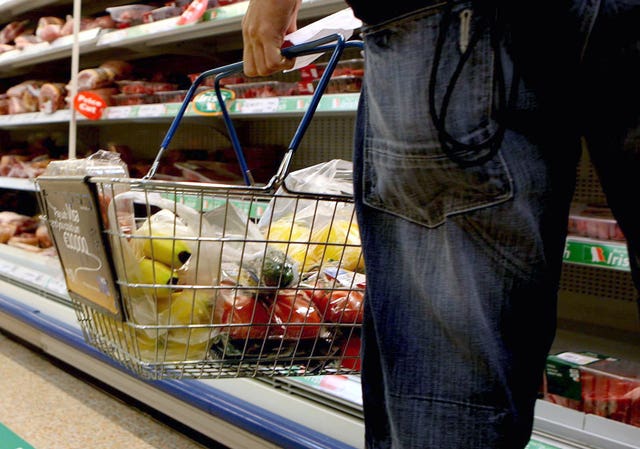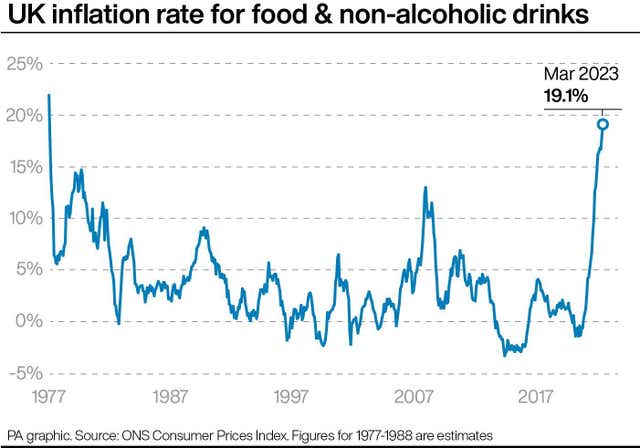
Shop price inflation eased back slightly from record highs last month despite another surge in food prices.
Food prices soared 15.7%, the highest on record, in April to continue pressure on consumer finances, according to the latest BRC-NielsenIQ shop price index.
However, spring discounting at fashion and furniture stores meant wider retail inflation slowed for the month.
The fresh figures reported shop price inflation of 8.8% in April against the same month a year earlier, easing slightly from 8.9% in March.

It came as non-food stores recorded inflation of 5.5% for the month, slipping from 5.9% in March as shops reduced prices in a bid to attract customers.
This fall offset the jump in food inflation to 15.7% from 15% in March.
Fresh food prices increased by a record 17.8% year-on-year for the month, while the price of ambient products, such as tinned goods and other store-cupboard items, increased 12.9%.
Helen Dickinson, chief executive of the British Retail Consortium (BRC), said: “Overall shop price inflation eased slightly in April due to heavy spring discounting in clothing, footwear, and furniture.
“However, food prices remained elevated given ongoing cost pressures throughout the supply chain.

“The knock-on effect from increased production and packaging costs meant that ready meals became more expensive and coffee prices were also up due to the high cost of coffee beans, as well as key producer nations exporting less.
“Meanwhile, the price of butter and vegetable oils started to come down as retailers passed on cost savings from further up the supply chain.”
Mr Dickinson added that shoppers “should start to see food prices come down in the coming months” amid reductions in wholesale prices and other costs.
Mike Watkins, head of retailer and business insight at NielsenIQ, said: “In recent weeks, more retailers have used loyalty schemes or money off promotions to help stimulate sales.
“However, with inflation yet to peak and sales volumes in decline in many channels, it’s difficult to second guess the strength of consumer confidence.”


Why are you making commenting on The Herald only available to subscribers?
It should have been a safe space for informed debate, somewhere for readers to discuss issues around the biggest stories of the day, but all too often the below the line comments on most websites have become bogged down by off-topic discussions and abuse.
heraldscotland.com is tackling this problem by allowing only subscribers to comment.
We are doing this to improve the experience for our loyal readers and we believe it will reduce the ability of trolls and troublemakers, who occasionally find their way onto our site, to abuse our journalists and readers. We also hope it will help the comments section fulfil its promise as a part of Scotland's conversation with itself.
We are lucky at The Herald. We are read by an informed, educated readership who can add their knowledge and insights to our stories.
That is invaluable.
We are making the subscriber-only change to support our valued readers, who tell us they don't want the site cluttered up with irrelevant comments, untruths and abuse.
In the past, the journalist’s job was to collect and distribute information to the audience. Technology means that readers can shape a discussion. We look forward to hearing from you on heraldscotland.com
Comments & Moderation
Readers’ comments: You are personally liable for the content of any comments you upload to this website, so please act responsibly. We do not pre-moderate or monitor readers’ comments appearing on our websites, but we do post-moderate in response to complaints we receive or otherwise when a potential problem comes to our attention. You can make a complaint by using the ‘report this post’ link . We may then apply our discretion under the user terms to amend or delete comments.
Post moderation is undertaken full-time 9am-6pm on weekdays, and on a part-time basis outwith those hours.
Read the rules hereLast Updated:
Report this comment Cancel